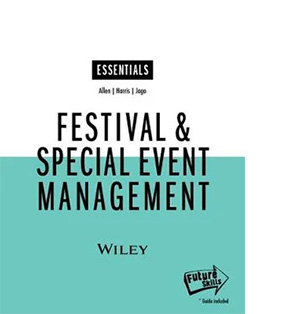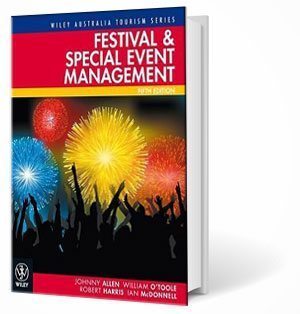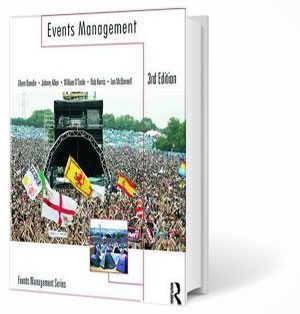Below are event management books written by Dr Rob Harris, Director of Event Training Australia, Former Director of Australian Centre for Event Management, University of Technology, Sydney, and (UTS) Business School Associate
Event Management (4th Edition)

A must-have introductory text of unrivalled coverage and depth focusing on events planning and management, the fourth edition of Events Management provides a complete A to Z of the principles and practices of planning, managing and staging events.
The book offers a systematic guide to organising successful events, examining areas such as event design, logistics, marketing, human resource management, financial planning, risk management, impacts, evaluation and reporting. The fourth edition has been fully updated and revised to include content covering technology, including virtual and hybrid events, concepts such as social capital, soft power and events, social inclusion, equality, accessibility and diversity, and the latest industry reports, research and legal frameworks. The book is logically structured and features new case studies, showing real-life applications and highlighting issues with planning events of all types and scales in a range of geographical locations.
This book has been dubbed ‘the events management bible’ and fosters an interactive learning experience amongst scholars of events management, tourism and hospitality.
By Glenn Bowdin, Johnny Allen, Robert Harris, Leo Jago, William O’Toole, & Ian McDonnell.
ISBN 9780367491840.
Festival and Special Event Management (6th edition) 2020

Event Training Australia is proud to announce the launch of the 6th edition of the text Festival and Special Event Management, 6th edition (2020). This new edition comes at a pivotal time, as the event industry faces its biggest challenge to date. The COVID-19 pandemic in the short term has shut down the industry, and its long-term impacts are expected to be far-reaching and profound. Many believe that it will hasten existing trends, such as the move to video conferencing and the live streaming of music-based festivals as travel becomes more expensive and borders remain closed. What the event industry will look like on the other side of the pandemic is unclear, as many event organising businesses will not have the financial capacity to bounce back, and government and corporate budgets will be heavily trimmed. In the Australian business events sector alone, 96 per cent of events were either cancelled or postponed in 2020, resulting in an estimated loss of some $37.7 billion. This dramatic pause in live events has, nonetheless, provided a powerful reminder of their economic and social value, and while it might take several years, they will return as restrictions are lifted to once again make their vitally important contribution to our lives and society.
As with previous editions, the authors have networked widely with leading event industry professionals to track and capture the developing knowledge base and best practice in the industry. This process also ranged across allied fields such as project management, marketing, environmental sustainability, tourism, financial management and law. The delivery of event courses by the lead authors in a wide variety of countries including Australia, New Zealand, the UK, China, Singapore and Malaysia has also brought a strong international perspective to the book, and this is further reflected in its variety of contributors, and event profiles and case studies.
Unlike traditional textbooks, Festival & Special Event Management Essentials is an aggressively concise, high-quality title that gives students the key content they need to succeed in their course and profession. Content is designed around weekly retrieval practice, a pedagogical strategy that is proven to enhance and boost learning. Students are further supported with engaging questions and illustrative examples that provide focus and added clarity.
As an added benefit, this book concludes with a Future Skills Guide, which provides practical advice from experts across technology, wellbeing, social intelligence, ethics, skills and development, design thinking and the future of work. The Guide will help students build career-relevant skills and knowledge to complement their specialist knowledge in the field of strategy has been comprehensively updated and provides a thorough overview of the theory and procedures associated with the planning and delivery of business and public events.
By Johnny Allen, William O’Toole, Robert Harris, Ian McDonnell.
ISBN: 978-1-742-16461-8
Festival and Special Event Management (5th edition)

Festival and Special Event Management, 5th edition continues the comprehensive overview of the theory and procedures associated with festivals and special events established in previous editions. The new edition of this market-leading text introduces developments and professional tools, and considers the globalisation and subsequent internationalisation of event management.
The role of marketing and communication, environmental planning, the increasing role of governments through the creation of event strategies, and the different perspectives of event management are all discussed. This edition aims to embrace and extend the growing body of knowledge relating to event management by tracking many of the recent changes and developments in the field. This offers students a current, relevant textbook for their study and professional reference.
By Johnny Allen, William O’Toole, Robert Harris, Ian McDonnell.
ISBN: 978-1-742-16461-8
Events Management

Events Management is the must-have introductory text providing a complete A-Z of the principles and practices of planning, managing and staging events.
The book introduces the concepts of event planning and management,presents the study of events management within an academic environment,discusses the key components for staging an event, covering the whole process from creation to evaluation,examines the events industry within its broader business context, covering impacts and event tourism,provides an effective guide for producers of events and contains learning objectives and review questions to consolidate learning.
Each chapter features a real-life case study to illustrate key concepts and place theory in a practical context, as well as preparing students to tackle any challenges they may face in managing events. Examples include the Beijing Olympic Games, Google Zeitgeist Conference, International Confex, Edinburgh International Festival, Ideal Home Show and Glastonbury Festival.
Carefully constructed to maximise learning, the text provides the reader with:
- a systematic guide to organizing successful events, examining areas such as staging, logistics, marketing, human resource management, control and budgeting, risk management, impacts, evaluation and reporting
- fully revised and updated content including new chapters on sustainable development and events, perspectives on events, and expanded content on marketing, legal issues, risk and health and safety management
- a companion website: http://www.routledge.com/books/details/9781856178181/ with additional materials and links to websites and other resources for both students and lecturers
by Rob Harris, Glenn Bowdin, Johnny Allen, Ian McDonnell and William O’Toole
ISBN-10: 1856178188 | ISBN-13: 978-1856178181
Regional Event Management Handbook

Provides those involved in the conduct of events in regional Australia with a comprehensive insight into the event management process.
By Rob Harris and Johnny Allen
ISBN: 1863655638, 9781863655637
